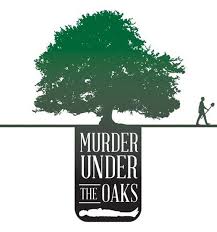A crime writing conference attracting 1400-some authors and readers, flush for four days with panels and book talk — that was the 45th annual Bouchercon “world  mystery convention,” held in Raleigh NC Oct. 8 through 11 at downtown Sheraton and Marriott hotels. Taking a break from music immersion, I attended as a fan with a draft of a novel of my own, hoping to get an overview of the scene, pick up tips and inspiration, discover promising new books.
mystery convention,” held in Raleigh NC Oct. 8 through 11 at downtown Sheraton and Marriott hotels. Taking a break from music immersion, I attended as a fan with a draft of a novel of my own, hoping to get an overview of the scene, pick up tips and inspiration, discover promising new books.
All plans accomplished. One of the rare areas in publishing that seems to continue thriving both in hard-bound or ebook platforms, name-brand presses and independents alike were well-represented in a sales room where three booksellers were constantly busy while writers signed copies of their works for people lined up with arms full of volumes. The conference runs on a quarter-million dollar budget (according to local chair Al Abramson, who like everyone else in the organization putting on the event works as a volunteer), yet sponsors laid low other than taking out ads in a 175-page program book and hosting receptions. The Anthony Awards were voted on and presented, there were both international and national guests of honor and lots of speeches, besides sociable button-holing in the hotels’ halls and a happy crowd almost always at the bar.
I skipped most of the organizational activities to focus on the 50-minute panels, typically involving four speakers and a moderator, running from 8:30 am ’til 5 pm most days — usually four or five simultaneously, which made browsing tricky. Topics ranged from craft issues to conceptual matters, and most of the talk was lively, though some speakers were of course more experienced and insightful than others.
“Crime fiction has kept its focus on story, which literary fiction has somewhat moved away from,” said crime fiction grand master Lawrence Block (or words to that effect — I didn’t take exact notes; recordings are available for sale of all sessions) on a panel titled “Human Nature: Our fascination with law breakers & law enforcers in fiction.” Block nailed the ongoing attraction of a genre which is so vast as to include cozy cat mysteries (like Cries and Whiskers by Clea Simon, wife of Boston jazz journalist Jon Garelick) as well as morality-challenging hard-boileds such as The Girl with the Deep Blue Eyes, Block’s own most recent twisted tale of sex and murder.
Evidently there are a zillion ways to die (to paraphrase the title of one of my faves of LB’s variegated oeuvre), and just as many storytellers delving into the possibilities. Although crime fiction goes way back — Cain killed Abel, remember?) fascination with antagonism, deception, violence and aftermath does not cease (want to know what happened to Cain?). My tastes lean towards the chilling and nasty, usually spiced with outré humor, sparked in my early teens by The Strange Case of Dr. Jekyll and Mr. Hyde and furthered by Red Harvest), which I expect to sate at least temporarily with the dozen or so books I acquired over the weekend (no felines involved) many by authors I met. To wit:
- Jewish Noir , edited and with a very fine introduction by Kenneth Wishnia);
- The Ghosts of Belfast, by Stuart Neville);
- Smonk, by Tom Franklin, one of this Bouchercon’s guests of honor;
- Three Women Walk into a Bar, by Linda Sands;
- The Genuine Imitation Plastic Kidnapping, by Les Edgerton;
- Broken Glass Waltzes, by Warren Moore;
- Rumrunners, by Eric Beetner;
- Send My Love and a Molotov Cocktail: Stories of Crime, Love and Rebellion, edited by Gary Phillips and Andrea Gibbons;
- Peckerwood by Jedidiah Ayres;
- Kwik Krimes, edited by Otto Penzler;
- GBH by Ted Lewis.
I’m also now eagerly awaiting Danny Gardner’s A Negro and an Ofay, about race, the mob and Chicago circa 1952, due out next month.
I went to two panels that were disappointing. The panelists on “Political Espionage Thrillers: Pre- and Post-Edward Snowden” included two former U.S. government intelligence officers and a federal marshall. They disapproved of Snowden’s leaks — fair enough — but spent the time denouncing him rather than discussing whether spy stories set in the present can anymore deal with spooks on the ground without getting into the intricacies of internet surveillance. And then there was “Room for All: The Diversity of Crime, Mystery and Thrillers,” populated by four white authors who spoke of gender and sexual preference issues but not race or ethnicity.
I suppose that reflected this strange thing about Bouchercon: by my rough estimate 75% women attendees yet at least 60% men as panelists, and only a handful of African-, Hispanic- or Asian-Americans in sight. Surely this will change, if only for marketing reasons. Considering crime statistics and the U.S. prison population, we need writers who will tell stories of non-white communities. Maybe next year, when Bouchercon takes place in New Orleans. I hope James Sallis will be there.
howardmandel.com
Subscribe by Email |
Subscribe by RSS |
Follow on Twitter
All JBJ posts |
[contextly_auto_sidebar]

